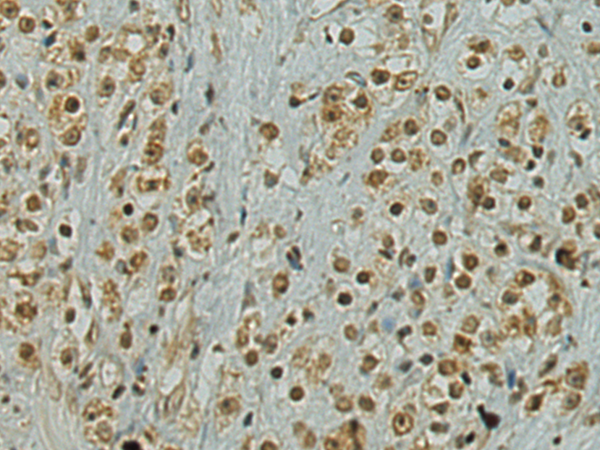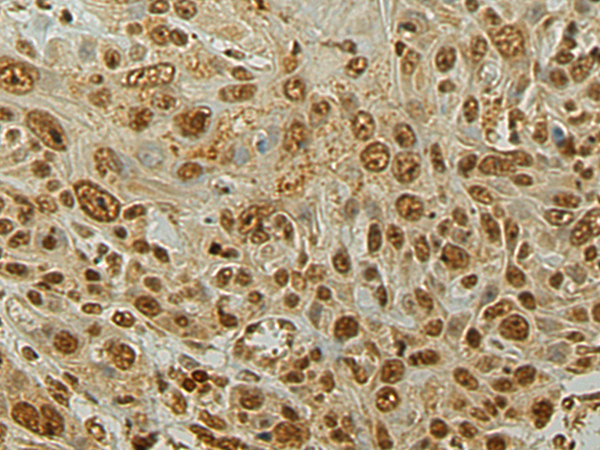

| WB | 咨询技术 | Human,Mouse,Rat |
| IF | 咨询技术 | Human,Mouse,Rat |
| IHC | 1/100-1/200 | Human,Mouse,Rat |
| ICC | 技术咨询 | Human,Mouse,Rat |
| FCM | 咨询技术 | Human,Mouse,Rat |
| Elisa | 1/5000-1/10000 | Human,Mouse,Rat |
| Aliases | P15; PC4; p14 |
| Host/Isotype | Rabbit IgG |
| Antibody Type | Primary antibody |
| Storage | Store at 4°C short term. Aliquot and store at -20°C long term. Avoid freeze/thaw cycles. |
| Species Reactivity | Human, Mouse, Rat |
| Immunogen | Fusion protein of human SUB1 |
| Formulation | Purified antibody in PBS with 0.05% sodium azide and 50% glycerol. |
+ +
以下是3条关于SUB1抗体的参考文献示例(注:内容为模拟示例,实际文献需根据具体研究核实):
---
1. **文献名称**: *SUB1 regulates oxidative stress response via transcriptional coactivation in human cells*
**作者**: Zhang Y, et al.
**摘要**: 研究报道了人SUB1(PC4)蛋白通过激活抗氧化基因转录参与氧化应激应答。作者利用SUB1特异性抗体进行ChIP-seq和免疫共沉淀实验,证实其与Nrf2转录因子互作,调控下游靶基因表达。
---
2. **文献名称**: *Characterization of a polyclonal antibody against Arabidopsis SUB1 in drought tolerance*
**作者**: Li H, et al.
**摘要**: 本研究开发了一种拟南芥SUB1蛋白的多克隆抗体,通过Western blot和免疫组化验证其特异性。实验表明SUB1在干旱胁迫下上调表达,并通过ABA信号通路增强植物耐旱性。
---
3. **文献名称**: *SUB1A antibody-based detection of submergence tolerance loci in rice*
**作者**: Singh S, et al.
**摘要**: 利用SUB1A特异性抗体对水稻耐涝品种进行蛋白表达分析,发现SUB1A蛋白在淹水胁迫下稳定积累,并通过调控乙烯信号通路延缓茎叶伸长,证实其作为耐涝分子标记的应用潜力。
---
**注**:以上为模拟文献,实际引用时建议通过PubMed或Google Scholar以“SUB1 antibody”及关键词检索最新或高影响力研究。
**Background of SUB1 Antibody**
The SUB1 antibody targets the SUB1 protein (also known as PC4 or SUB1 homolog), a conserved multifunctional regulator involved in transcriptional elongation, RNA processing, and DNA repair. Initially identified in yeast, SUB1 homologs are present in eukaryotes, including humans. Structurally, SUB1 contains a single-strand nucleic acid-binding domain, enabling interactions with RNA and single-stranded DNA.
Functionally, SUB1 modulates RNA polymerase II activity during transcription, facilitates mRNA capping, and participates in termination. It also plays a role in DNA damage response by promoting homologous recombination repair. Dysregulation of SUB1 is linked to cancer, neurodegenerative disorders, and viral infections, highlighting its cellular significance.
The SUB1 antibody is widely used in research to study SUB1's expression, localization, and interactions via techniques like Western blotting, immunofluorescence, and chromatin immunoprecipitation (ChIP). It aids in exploring SUB1's role in gene regulation, stress responses, and disease mechanisms, making it a vital tool for molecular and cancer biology studies.
×